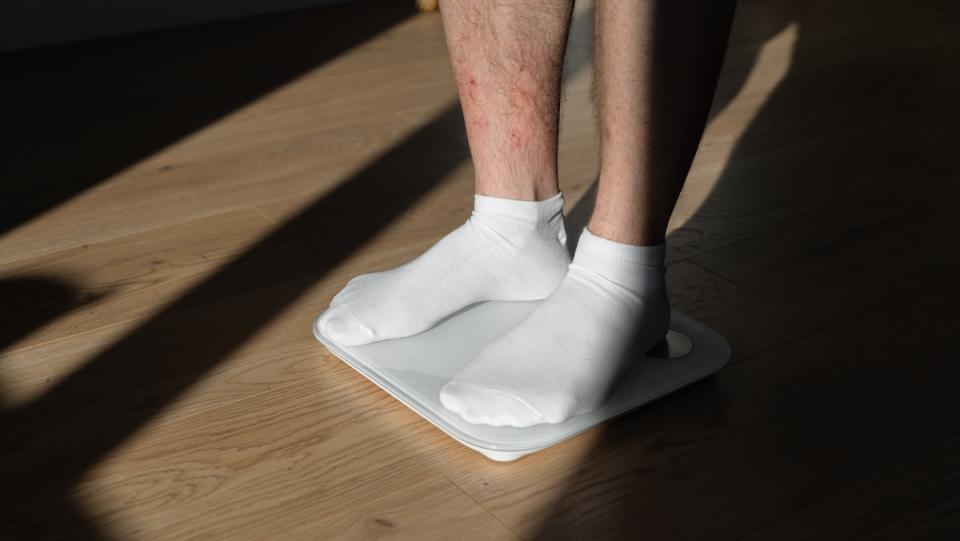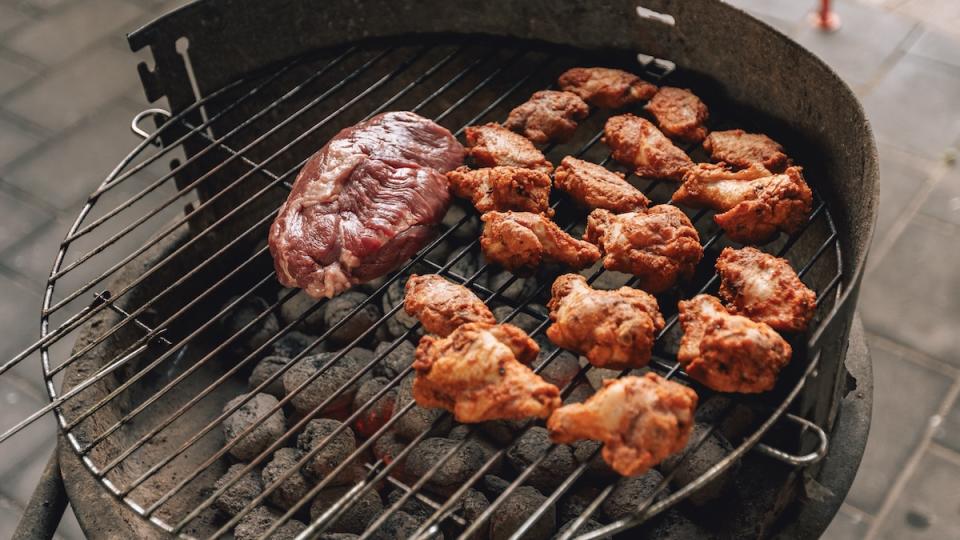The Keto Diet vs. The Carnivore Diet: Is Increasing Meat Consumption Really Better?
Although eating plant-based is more popular than ever, two meat-forward diets are gaining significant traction: The keto diet and the carnivore diet. On the keto diet, dieters lower their carbohydrate intake to less than 50 grams a day, while increasing their fat and protein intake. The carnivore diet, however, is a specific type of keto diet, which only allows for the consumption of meat, eggs, fish and dairy.
Kylie Bensley, MS, RD, of Sulinu explains that keto has many variations, including the carnivore diet. But the main difference is that carnivore emphasizes protein, whereas keto emphasizes fats: "The motivation behind the carnivore or ketogenic diet is often weight loss or blood sugar management," she explains.
There are many variations of the keto diet — including the carnivore diet. Typically the standard ketogenic diet is high in fat versus protein, whereas the carnivore diet is higher in protein.
Kylie Bensley
Keto vs. The Carnivore Diet: A Side-By-Side Comparison

Getty
The Keto Diet Is All About Protein and Fat

Getty
The keto diet instructs followers to consume mostly meat, fish, low-sugar fruit, and low-starch vegetables (aka mostly fat and protein). According to UConn Health, those adhering to the diet are encouraged to shy away from all carbs and sugar: No grains, refined sugars, refined oils or alcohol.
The ultimate goal, which only takes a few days, is to put the body in ketosis — but the challenge is to keep it there. A day, or even a meal, containing more than 50 grams of carbohydrates can throw the body out of ketosis, which will take a few days to get back into.
Ketosis Supposedly Burns Fat for Energy, Instead of Carbohydrate Stores
Ketosis is when the body supposedly starts burning fat as opposed to glucose, according to a blog post from The University of Kansas. This can supposedly happen within a few days of being on the diet.
"In keto diets, where carbs are extremely limited, the body instead draws its energy from dietary fat and the body’s fat storage, which produces ketone bodies," the University of Kansas Medical Center's Anne Christiansen-Bullers tells us. "Those ketone bodies then can be measured in the blood to see if ketosis —the act of the body burning up fat instead of carbs — has been achieved."
Weight Loss Is Quick, Short-Term

Getty
Aside from giving dieters the opportunity to eat tasty high-fat foods, the diet has gained notoriety because of its quick results. According to Parade, dieters can lose up to two pounds per week. In addition to the fact that the body is burning through fat storages, this is also because the body is purging itself of water weight.
"... Your body stores carbs with water, so when you use up your carb stores, you lose water weight," Natalie Romito, RD, LD and Amanda Garman, MS, RDN, LD of Firelands Health write.
The Keto Diet Is Also Used To Treat Medical Conditions

Getty
In addition to being used for weight loss, keto is sometimes used to treat other conditions. The Cleveland Clinic notes the diet was created to treat children with epilepsy, because it often reduces seizures and other symptoms of the condition. A study published to the National Library of Medicine also shows it helps slow retinol degeneration in mice, among other possible chronic conditions.
RELATED: Keto Ice Cream Is the Cool Way to Boost Weight Loss — Here’s the 4-Ingredient Recipe
The Short-Term Side Effects Can Be Unpleasant
The keto flu is a common short-term side effect of keto, which comes within the first four weeks of ditching carbohydrates. A study published to the National Library of Medicine lists common symptoms of the keto flu, include:
Headache
Fatigue
Nausea
Dizziness
Brain fog
Gastrointestinal discomfort
Decreased energy
Feeling faint
Heartbeat alterations
While Weight Loss Is Likely, the Dangers of Keto May Deter Dieters

Getty
UChicago Medicine warns dieters of potential long-term effects of keto. In addition to nutrient deficiencies that may coincide with eliminating entire food groups, dieters are put at risk of low blood pressure.
A blog post from Pharmasave explains this is because of lower insulin levels: "When you switch to a ketogenic diet, your body releases little insulin so less potassium is stored, less water is retained, blood volume goes down and your blood pressure decreases," the article reads.
Those with kidney issues are also discouraged from trying the diet, as kidney stones and other related issues are quite common. Keto can even lead to cardiovascular problems, which comes from increasing meat and fat consumption.
The Carnivore Diet Only Allows for the Consumption of Animal Products

Getty
The carnivore diet is exactly what it sounds like: Followers subsist only on animal products and byproducts. Eliminating all carbohydrates, including fruits and vegetables, the diet solely allows for meat, fish, dairy and eggs. According to McGill University, some versions of the diet even eliminate seasoning, and meats other than beef.
Related: Flexitarian and Mediterranean: Plant-Forward Diets With Key Differences
The Benefits of the Carnivore Diet Are Mostly Anecdotal
The carnivore diet, which has gained popularity recently through social media influencers like the so-called Liver King, comes with many supposed benefits. According to the Cleveland Clinic, many advocates of the diet allege the diet triggers weight loss, improves mood, regulates blood sugar and can even stave off chronic diseases. However, not many of these claims are medically-backed, as most of these come from influencer testimonies.
However, BBC notes there are benefits that come with eating animal products and byproducts. Meat is a reliable source of protein, iron, zinc, selenium, vitamin D, and vitamins B6 and B12. Fish is rich with high-quality protein, omega-3 fatty acids, vitamin D, selenium and iodine. And dairy is high in protein, calcium, iodine and B vitamins.
The Weight Loss May Largely Due to Lack of Available Snacks
Even though many have found luck on the carnivore diet, Kylie Bensley wonders if the weight loss is solely due to cutting out so many available foods. Without any carbohydrates, one is more likely to consume less altogether.
"Of course, if you are cutting out an entire macronutrient (carbohydrates) for a ketogenic diet and even more foods and food groups with the carnivore diet, you will be likely to lose weight," she says. "This isn’t due to the diet itself but an overall deficit in calories due to less available options to eat and often less desirable."
Side Effects Are Similar to That of Keto — Minus the Constipation

Getty
Diets that are high in both fat and protein come with a number of unpleasant side effects. An article about the diet from WebMD notes that dieters complain of similar short-term symptoms to keto: headaches, nausea and low energy.
However, one symptom that differs from the keto flu? Instead of experiencing constipation, some complain of... "loose poop."
"Not getting enough fiber from your diet could cause constipation. Interestingly, people who have tried this diet reported the opposite side effect: diarrhea," Stefanie Watson writes in WebMD. "A high-fat, high-protein diet may cause loose poop because it changes the balance of good and bad bacteria in the gut."
The Carnivore Diet Hasn’t Been Studied Long-Term, But Many Studies Show Long-Term Risks From Eating Too Much Meat

Getty
The carnivore diet hasn't been extensively studied by medical professionals, because it's relatively new on the diet scene. But, there have been many studies on long-term risks of meat-heavy diets, which are plentiful — and the risks are substantial.
"The fats consumed in the carnivore diet are typically saturated which is an unhealthy type of fat, especially to consume in large quantities because it raises LDL 'bad cholesterol," Bensley says. "Having elevated LDL cholesterol can lead to a whole slew of health issues. People who follow a carnivore diet have a high risk of kidney stones, kidney dysfunction, osteoporosis and gout."
More Meat Can Also Shorten Your Lifespan
Major studies, including one from Archives of Internal Medicine, have shown that meat-heavier diets tend to result in early death. An ideal diet, the study concludes, includes less red meat and more meat substitutes such as nuts, fish and legumes.
"The study determined that each additional daily serving of red meat increased risk of death by 13 percent," says an article about the study from Harvard. "The impact rose to 20 percent if the serving was processed, as in food items like hot dogs, bacon, and cold cuts."
The Restrictiveness of Both Diets May Cause Issues

Getty
In addition to eliminating essential vitamins and minerals, both the keto and carnivore diets' restrictions can cause serious mental issues. Because it's difficult to stick to, it may lead to yo-yo dieting and disordered eating habits. So those with a history of disordered eating generally aren't advised to start such restrictive diets like these, however, speaking with an expert beforehand is generally advised.
"Due to the restrictive nature of the ketogenic and carnivore diets, expected adherence would be low," Katie Bensley says. "The more restrictive a diet is, the harder it will be to stick to. Prescribing a restrictive diet is setting up a client for failure."
Both Diets Will Raise Your Grocery Expenses

Getty
As it goes with any diet that strays from the typical American diet, keto and carnivore are both relatively costly. Without carbohydrates and processed foods, to supplement meat, dairy, fish, and produce (on keto), a weekly grocery haul is bound to be more expensive. Of course, frozen and canned goods can be replaced for fresh produce on keto, while cheaper proteins — such as eggs and tinned fish — can replace high-end cuts of meat for both diets. But that would greatly limit an already-restrictive diet.
Less Restrictive Diets May Be Better

Getty
Although both the keto and carnivore diets have reportedly worked for some people, both are highly restrictive, and maybe not worth it in the long run. Stanford University explains there are many diets — such as the Mediterranean diet — that are much less restrictive than keto. However, they have produced similar weight loss results.
Likewise, the carnivore diet is even more restrictive. And while it's studies are lacking, it's been shown that a meat-heavier diet often results in more long-term risks, including heart issues, cancer, and more.
Therefore, Bensley says a less restrictive diet than either may be better: "Neither the carnivore or ketogenic diet is necessary to meet various health goals," she says.
If weight loss is the goal, a simple calorie deficit without extreme restriction will work. Rather than cutting out all carbohydrates, a person can limit their processed carbohydrate intake and focus on carbohydrates from whole food sources such as fruits, vegetables, whole grains and plant-based protein.
How long does it take to get into ketosis?
It can take as little as two days, or as many as four days, to enter ketosis. However, more than 50 grams of carbohydrates can boot the body out of ketosis, so staying vigilant is important.
Should I limit protein intake on keto?
On the keto diet, 10 to 20 percent of calories should come from protein. Harvard Health warns that too much protein can kick the body out of ketosis, though, so monitoring that closely may be essential.
Can I drink alcohol on keto?
Drinks such as wine and liquor are OK on keto, unlike beer or other grain-derived drinks. However, drinking alcohol may slow the ketosis process, so foregoing too many drinks in a week is recommended, for optimal results.
What snacks can I eat on the carnivore diet?
On the carnivore diet, crackers, chips and other typical snack foods aren't allowed. But Meat Health recommends carnivore diet-friendly snacks, including: deli meat, hard boiled eggs, cheese sticks, butter, jerky, pork rinds, bone marrow, bone broth and bacon.
How long does the carnivore diet take to work?
Depending on a variety of factors, some on the carnivore diet lose significant amounts of weight, short-term. Brian Nowicki of Newsweek reported that he lost 65 pounds in the first four months. However, there is not a lot of medical research on the diet to determine an average amount of weight one generally loses on the diet.
This content is not a substitute for professional medical advice or diagnosis. Always consult your physician before pursuing any treatment plan.

